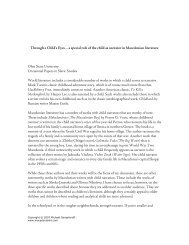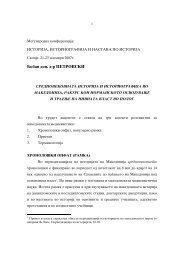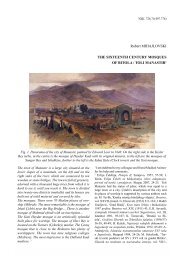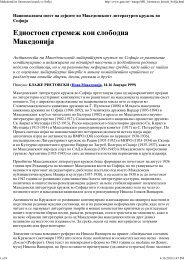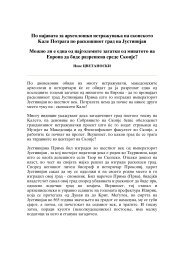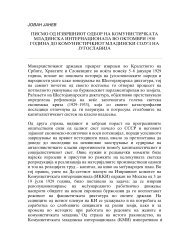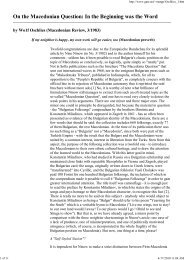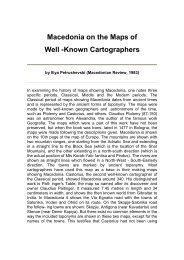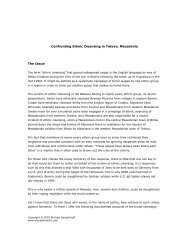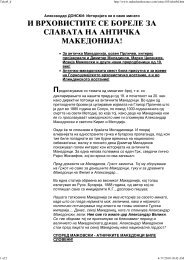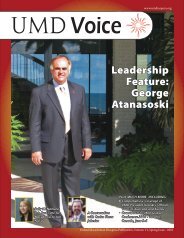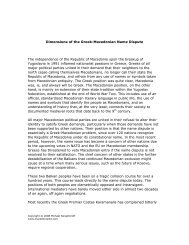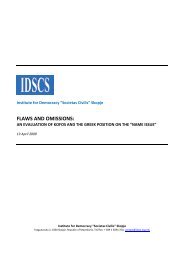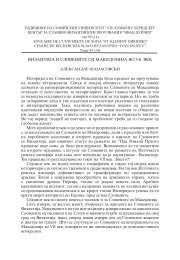Macedonian State-National Concepts and ... - Makedonika
Macedonian State-National Concepts and ... - Makedonika
Macedonian State-National Concepts and ... - Makedonika
Create successful ePaper yourself
Turn your PDF publications into a flip-book with our unique Google optimized e-Paper software.
War. This was another testimony to the sympathies that the <strong>Macedonian</strong>s, too,<br />
nourished for the genuine South-Slav (Yugoslav) idea, as the foremost token of<br />
the freedom, self-determination, self-rule <strong>and</strong> equality of the peoples in the Balkan<br />
region. And the prospects of what was becoming a historical consciousness seemed<br />
auspicious.<br />
17.<br />
The activity of the <strong>Macedonian</strong> émigré community in Bulgaria was of particular<br />
significance at that time. “The forces of the left” were among the first to raise their<br />
voice for the preservation of Macedonia’s entirety <strong>and</strong> for securing its freedom.<br />
Perhaps this was most vividly expressed in Dimitar Blagoev’s words, who as early<br />
as December 10, 1917 (speaking in the Bulgarian <strong>National</strong> Assembly in connection<br />
with the adoption of the military budget for the coming year), condemned<br />
Bulgarian policy as acquisitive <strong>and</strong> favouring division. He added that the First<br />
World War was in fact a continuation of the previous wars for establishing “full<br />
control over the Slavic element in Macedonia”. When the bourgeois representatives<br />
dem<strong>and</strong>ed of him that he explain his descent <strong>and</strong> his position on<br />
Macedonia more clearly <strong>and</strong> more openly in public, he bravely declared: “I was<br />
born in ZagoriÌani; however, I am not a Bulgarian, but a Slav, <strong>and</strong> being that, if<br />
you want to know, I am for Macedonia, as a Slavic l<strong>and</strong>, which would have its own<br />
administration.” A year later he presented the same views, once again in the<br />
<strong>National</strong> Assembly, as the leader of the Bulgarian Social Democratic Party. He<br />
dem<strong>and</strong>ed the withdrawal of Bulgarian troops from Macedonia <strong>and</strong> its return to<br />
the <strong>Macedonian</strong>s “who, in full freedom, will decide on their future themselves”.<br />
Supporting the signing of peace, Blagoev made it clear that the <strong>Macedonian</strong>s were<br />
not Bulgarians <strong>and</strong> repeated his conviction that Macedonia had been occupied <strong>and</strong><br />
annexed by force by Bulgarian thieves. In reply to the retorts of some representatives<br />
that the Bulgarians were Macedonia’s liberators, he said: “Macedonia<br />
is not liberated; that is what the <strong>Macedonian</strong>s themselves think, <strong>and</strong> your goals in<br />
the Balkan [Wars] <strong>and</strong> now are acquisitive.” Therefore, he dem<strong>and</strong>ed of the<br />
Bulgarian government that it leave Macedonia <strong>and</strong> make it possible for the<br />
<strong>Macedonian</strong>s to decide freely on their future, because “a large part of the <strong>Macedonian</strong><br />
intelligentsia wishes Macedonia to be for the <strong>Macedonian</strong>s” <strong>and</strong> “even in<br />
Bulgaria the <strong>Macedonian</strong> activists propagate Macedonia for the <strong>Macedonian</strong>s, an<br />
independent Macedonia”, as a result of which it was necessary for the <strong>Macedonian</strong>s<br />
themselves to state “what they feel themselves to be”.<br />
Another ‘leftist’, the old socialist revolutionary <strong>and</strong> comrade of DelÌev <strong>and</strong><br />
S<strong>and</strong>anski, Dimo HadÔidimov, during “the Ilinden celebrations” in Sofia, when<br />
276



